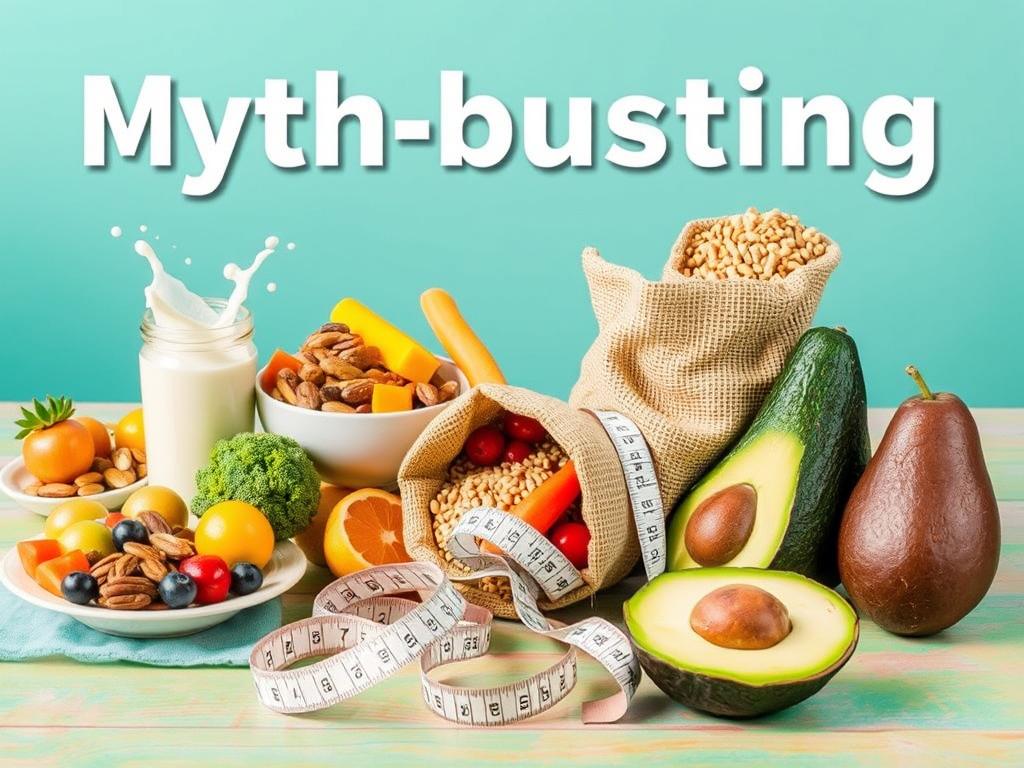Did you know that nearly 70% of Americans believe that cutting carbs is the key to weight loss?
This widespread misconception is just one among many nutrition myths that can lead us down a path of unhealthy eating. In a world filled with conflicting dietary advice—often perpetuated by social media and outdated information—understanding what to believe can be a challenge.
This article aims to clarify these misconceptions by unpacking the Top 7 Nutrition Myths You Should Stop Believing, offering evidence-based nutrition advice and healthy eating tips. By debunking these nutrition myths, readers will gain a clearer perspective on how to make informed choices about their diets.
For a deeper dive into these common misconceptions, check out the detailed insights in this comprehensive guide.
Key Takeaways
- Carbohydrates are essential for sustained energy; cutting them isn’t always helpful.
- Healthy fats are crucial for overall health, while unhealthy fats should be limited.
- Your body naturally detoxifies; extreme detox diets are not necessary.
- Whole foods typically offer greater nutritional value than processed options.
- Skipping meals can backfire and lead to overeating later.
nutrition myths 1: Carbs Are Bad for You
Carbohydrate myths often suggest that all carbs are detrimental to your health. In reality, carbohydrates are essential for energy and brain function. An adequate intake of healthy carbs is crucial for daily nutrition, and understanding the different types can significantly impact your health.
The Role of Carbohydrates in Your Diet
Carbohydrates serve as the body’s primary energy source. They fuel not only physical activity but also cognitive functions. Studies indicate that whole grains are particularly effective in reducing the risk of type 2 diabetes, showcasing the benefits of incorporating healthy carbs into your diet. Choosing whole grains instead of refined carbs can lead to better health outcomes, including lower mortality rates, especially concerning cardiovascular disease.
Different Types of Carbs Explained
It is essential to differentiate between complex and refined carbohydrates. Healthy carbs, such as those found in whole grains, fruits, and vegetables, provide essential nutrients, whereas refined carbs lack beneficial fiber and can contribute to various health issues. Here’s a brief comparison:
| Type of Carb | Examples | Health Benefits |
|---|---|---|
| Complex Carbs | Whole grains (brown rice, quinoa) | Reduced risk of type 2 diabetes, lower mortality risk |
| Refined Carbs | White bread, sugary snacks | Higher risk of chronic diseases |
Incorporating more whole grains into your meals can help reduce inflammation and provide lasting energy. On the contrary, adhering to low-carb diets may not decrease the risk of cardiovascular disease and has been associated with increased mortality rates. Understanding these carbohydrate myths and making informed choices can significantly enhance overall health.

For additional insights into healthy foods, learn more about the amazing health benefits of nuts here.
Myth 2: Fat Makes You Fat
The long-standing belief that all dietary fat leads to weight gain overlooks essential facts about the types and functions of dietary fat. Understanding the distinctions between healthy fats and unhealthy fats is crucial for making informed dietary choices.
Understanding Healthy Fats vs. Unhealthy Fats
Healthy fats, such as those found in avocados, nuts, and olive oil, play a vital role in overall nutrition. These monounsaturated and polyunsaturated fats can improve heart health by increasing good cholesterol (HDL) while decreasing bad cholesterol (LDL). On the other hand, unhealthy fats, including saturated and trans fats, can raise cholesterol levels and negatively impact health. Saturated fats, like those from coconut oil and animal meat, contain 9 calories per gram and may raise cholesterol levels if consumed excessively. Trans fats, banned in the U.S. since 2018, increase “bad” cholesterol and lower “good” cholesterol, posing further risks to cardiovascular health.
The Importance of Fat in Nutritional Balance
Fat myths often overshadow the truth about dietary fat’s benefits. Healthy fats are essential for energy and are necessary for the absorption of certain vitamins. A balanced intake focusing on heart-healthy monounsaturated and polyunsaturated fats supports overall wellness. Studies indicate that when consumed in moderation, dietary saturated fat can have a neutral effect on cholesterol levels. This indicates that the quality of fat consumed is more significant than just the quantity. It is crucial to remember that weight gain results from consuming more calories than are burned, regardless of the macronutrient source

| Type of Fat | Sources | Effects on Cholesterol |
|---|---|---|
| Saturated Fat | Coconut oil, animal meats | May raise LDL when consumed excessively |
| Trans Fat | Hydrogenated oils, margarine | Increases LDL, decreases HDL |
| Monounsaturated Fat | Olive oil, avocados | Decreases LDL, increases HDL |
| Polyunsaturated Fat | Fatty fish, nuts | Decreases LDL, increases HDL; essential but monitor omega-6 intake |
Myth 3: You Need to Detox to Cleanse Your Body
The idea that detox diets are essential for body detoxification has become a popular belief, yet it overlooks the body’s natural processes. The human body is inherently equipped to eliminate toxins through organs like the liver and kidneys. Understanding how these systems function can dispel several detox myths.
How Your Body Naturally Detoxifies
Your body employs various mechanisms to maintain health and eliminate harmful substances. The liver processes toxins and the kidneys filter waste efficiently. Skin and lymphatic systems also play significant roles in detoxification. Engaging in natural detox practices such as staying hydrated, eating balanced meals, and exercising can further support these systems without the need for restrictive detox diets. Instead of seeking quick fixes, adopting consistently healthy habits proves far more effective in maintaining optimal body function.
The Science Behind Detox Diets
Despite the appeal of detox diets promising quick benefits, research consistently shows their lack of effectiveness for long-term toxin elimination. These diets often restrict essential nutrients and may lead to deficiencies. Only about 20% of individuals meet the recommended intakes for fruits and vegetables, key sources of vitamins and phytonutrients. Studies highlight that improving diet quality by incorporating a variety of whole foods leads to better health outcomes than following temporary detox plans. Sustainable dietary changes foster true health and well-being.

Myth 4: All Calories Are Created Equal
The perception that all calories have the same nutritional value is one of the common calorie myths that can lead to confusion when it comes to healthy eating. While caloric intake plays a significant role in weight management, not all calories contribute equally to your health and well-being.
The Quality vs. Quantity Debate
When assessing caloric intake, distinguishing between quality calories and empty calories is critical. Nutrient-dense foods such as fruits, vegetables, whole grains, and lean proteins provide essential vitamins and minerals that promote overall health. By contrast, empty calories found in processed snacks, sugary drinks, and fast food lack significant nutritional benefits. Statistics from the American Heart Association indicate that most Americans are already exceeding their daily sugar and sodium recommendations, consuming far more than the advised limits.
Nutrient Density and Its Importance
Nutrient density is a crucial component in evaluating the effectiveness of your diet. Foods that are high in nutrient density not only satisfy hunger but also support energy levels and cognitive function. Interestingly, only 1 in 10 Americans consumes the recommended servings of fruits and vegetables. Integrating more nutrient-dense foods can have transformative effects on health. For more ideas on incorporating healthy options into your breakfast routine, check out these nutritious breakfast ideas.
| Food Type | Nutritional Value | Caloric Content |
|---|---|---|
| Nutrient-Dense Foods | High in vitamins, minerals, and antioxidants | Varies, but typically low to moderate |
| Empty Calories | Low in nutrients, high in sugar and fat | Often high |
Myth 5: Skipping Meals Helps You Lose Weight
Meal skipping is a prevalent idea among those seeking rapid weight loss. Many believe that reducing the number of meals leads to lower calorie consumption. Yet, this concept is laden with weight loss myths. In fact, regular meal consumption plays a crucial role in maintaining energy levels and regulating hunger, critical for effective weight management.
The Benefits of Regular Meals
Eating frequency significantly influences metabolism and overall well-being. Individuals who maintain a consistent meal schedule often find it easier to control hunger and prevent overeating. Research shows that people who skip breakfast are typically heavier than those who regularly eat a nutritious morning meal. Regular meals can lead to healthier snacking habits, as those who include small, balanced snacks are less likely to be overweight or obese. Incorporating nutrient-dense foods such as Greek yogurt, fruits, and vegetables enhances both satisfaction and nutrition without excessive calorie intake.
The Impact of Skipping Meals on Metabolism
Metabolism myths frequently arise regarding meal skipping. In reality, when individuals skip meals, they may experience increased hunger later, leading to excessive eating. This pattern disrupts metabolic balance and can hinder weight loss efforts. Studies conducted by institutions like the National Institutes of Health reveal that limiting dietary fat can also be more beneficial for reducing body fat than restricting carbohydrates. Sustaining a metabolism-friendly approach encourages regular intake of healthy foods, making it easier to achieve lasting weight loss results.
Myth 6: You Should Avoid Gluten Even If You’re Not Celiac
The belief that everyone should steer clear of gluten has gained traction in recent years, leading to confusion about its implications for health. While celiac disease affects around 1 in every 133 Americans, causing severe reactions to gluten, this doesn’t apply to the majority of the population. About 90 percent of people are gluten tolerant and can consume gluten-rich foods without any issues. Many who think they are sensitive to gluten might find they can eat it without problems, with 86 percent of these individuals experiencing no negative effects.
Understanding Gluten and Its Effects
Gluten is a protein found in wheat, barley, and rye. It can play a vital role in providing necessary nutrients. Whole grains that contain gluten often contribute essential vitamins and minerals to the diet. Consuming a well-rounded diet can support overall health and weight management, regardless of whether it is low-fat or low-carb. Gluten-free diets may not necessarily lead to weight loss; processed gluten-free foods can lack essential nutrients and may cause overeating due to increased hunger.
Identifying Gluten Sensitivity vs. Intolerance
Gluten sensitivity is a condition where individuals experience symptoms similar to those of celiac disease after consuming gluten, yet do not test positive for the disorder. It is essential to differentiate between the two, as most people can incorporate gluten into their meals without adverse effects. Those following healthy eating patterns, such as the Mediterranean or DASH diets, often consume gluten, observing the benefits of a balanced intake of food groups. For those who do choose to go gluten-free, understanding the shift in production techniques means that flavor and quality in gluten-free options have significantly improved over the last five years. For more information on nutrition and beneficial dietary components, you may find value in exploring this resource.
Myth 7: Supplements Can Replace a Healthy Diet
A prevalent belief among many individuals is that nutrition supplements can serve as a substitute for a balanced diet. However, this is one of the common supplement myths that can lead to misguided health decisions. Whole foods provide a spectrum of nutrients, including vitamins and minerals, that processed dietary supplements cannot fully replicate. While supplements can help address specific deficiencies, they should not be viewed as a replacement for the benefits of a diverse diet rich in whole foods.
The Reality of Nutrition Supplements
Counter to popular opinion, approximately three out of every four American consumers regularly take dietary supplements, often underestimating the critical role of food quality in their overall health. Studies have shown that low-calorie diets, which often rely heavily on supplements, rarely lead to long-term success, causing more metabolic risks than benefits. Additionally, recent research suggests that calcium supplements may even pose risks, such as an increased likelihood of heart disease.
Whole Foods vs. Processed Supplements
In contrast to the convenience of nutrition supplements, whole foods have been proven more effective in supporting long-term health. Nutrition experts consistently stress that a nutritious diet filled with whole foods trumps the mere quantity of nutrients consumed. Not only do these foods provide essential nutrients, but they also promote healthier lifestyle patterns, reducing the risk of chronic diseases. For those looking to enhance their diet with Vitamin C and improve their immune support, focusing on whole food sources rather than relying on supplements is a more effective strategy. For more information on Vitamin C’s role in maintaining health, visit this resource.











